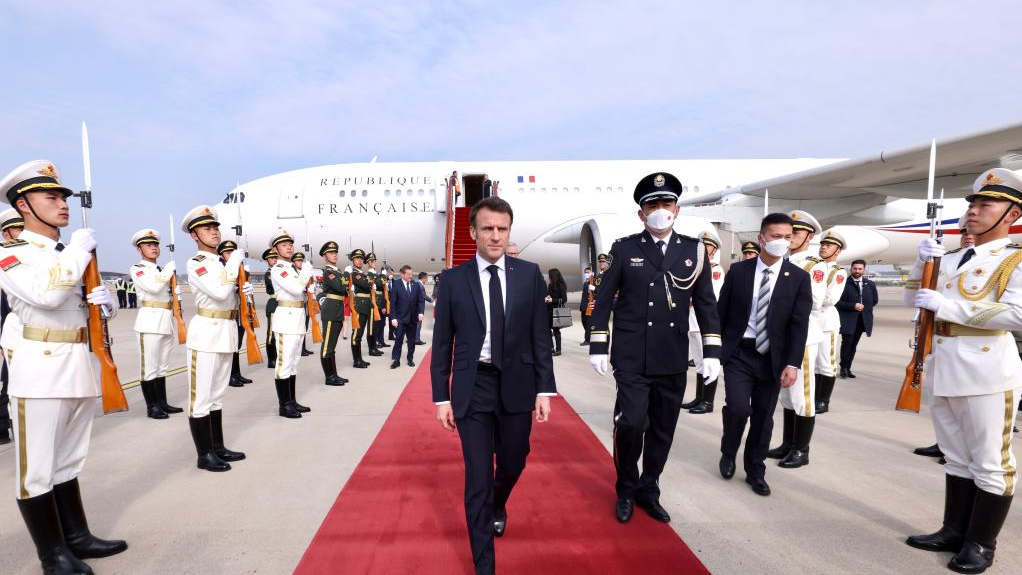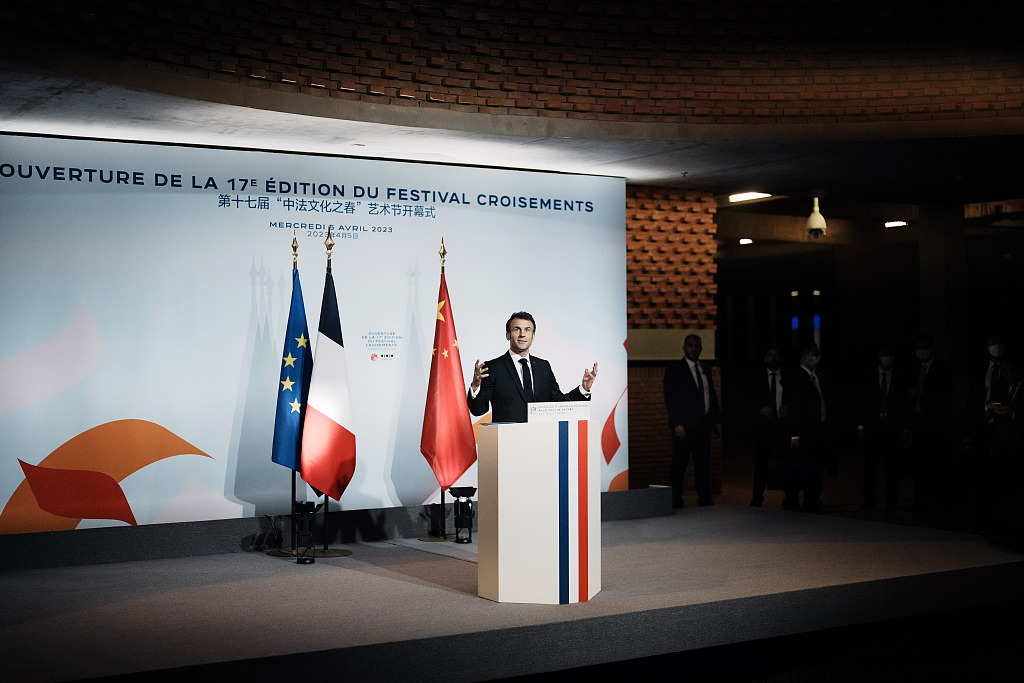
French President Emmanuel Macron arrives at Beijing Capital International Airport in Beijing, capital of China, April 5, 2023. /Xinhua
French President Emmanuel Macron arrives at Beijing Capital International Airport in Beijing, capital of China, April 5, 2023. /Xinhua
Editor's note: Jian Junbo is an associate professor and the deputy director of Center for China-Europe Relations at Fudan University. He is also the under-secretary general of Shanghai Institute for European Studies. The article reflects the author's views and not necessarily those of CGTN.
Chinese President Xi Jinping held talks with French President Emmanuel Macron in Beijing on Thursday, calling on both sides to enhance cooperation between China and the EU.
Amid ongoing domestic labor protests in France, President Emmanuel Macron's visit to China highlights his strong desire to strengthen China-France relations. It also signals that the French government seeks to bolster ties with China in order to meet the expectations of French businesses, address its domestic economic downturn, and resolve global challenges. However, some inherent structural issues will continue to exist in the long run. Since the outbreak of the COVID-19 pandemic, China-EU relations have been in a kind of stalemate, which was further aggravated by mutual sanctions and counter-sanctions in 2021. After the Russia-Ukraine conflict that began in February 2022, the political trust between the two sides dropped to a new low.
However, after some tentative engagement driven by respective economic and strategic development needs, China-EU relations began to warm up at the end of 2022, marked by the visit of German Chancellor Olaf Scholz and European Council President Charles Michel to China. The joint visit of President Macron and President of the European Commission Ursula von der Leyen to China is the latest signal that Europe intends to improve bilateral relations. The primary achievements of this visit can be anticipated in the following areas:
Firstly, from a political standpoint, Macron's visit to China following the 20th National Congress of the Communist Party of China signifies France's desire to enhance bilateral relations. It also reflects the gradual restoration of political trust between the two nations, as well as their willingness to engage in dialogue and promote cooperation at the strategic level. These factors provide substantial momentum for reinvigorating and expanding collaboration between the two countries in the fields of economy, trade and culture.
Secondly, from an economic perspective, the Chinese and French governments have discussed potential cooperation across various sectors, including aviation, energy, healthcare and biotech. Macron's visit, accompanied by a sizeable business delegation, underscores the strong commitment of the French government and business community to restoring and enhancing bilateral economic and trade cooperation in the post-pandemic era.
While France ranks third in China-EU trade relations in terms of total investment and trade volume in 2021, it trails significantly behind Germany. This visit has the potential to strengthen the depth and breadth of China-France trade cooperation, thereby solidifying China-EU economic ties as a whole. For China, an enhanced China-France trade relationship can boost foreign investors' confidence in the stability of the Chinese market.
Thirdly, representatives from the French cultural sector joined the visit, propelling bilateral cooperation in the cultural realm to new heights. Both China and France are culturally rich nations with distinctive cultural heritage and influence. The two countries have established high-level cultural exchange mechanisms. On top of that, Macron's visit to China will advance the cultural and people-to-people exchanges, foster the coexistence of diverse global cultures, and facilitate mutual learning among different civilizations. In the future, deepening cultural exchanges between the two countries will further promote mutual understanding between the two peoples.
Moreover, in terms of global issues, China and France are engaged in in-depth discussions on a range of topics, such as resolving the Russia-Ukraine conflict, addressing global climate change, and tackling energy challenges. These discussions carry positive implications for fostering mutual understanding on relevant issues and even jointly working towards resolving these problems.

French President Emmanuel Macron delivers a speech to inaugurate the Festival Croisements at the Red Brick Museum, Beijing, China, April 5, 2023. /CFP
French President Emmanuel Macron delivers a speech to inaugurate the Festival Croisements at the Red Brick Museum, Beijing, China, April 5, 2023. /CFP
Nevertheless, some structural contradictions will stand out during this visit, posing long-term challenges for China-France and China-EU relations.
Firstly, in the field of economy and trade, both sides have long-standing disputes over issues such as greater market access. One of the primary goals of Macron's visit is to encourage China to broaden market access for European capital, adjust state subsidy practices, and address imbalances in bilateral trade.
However, these issues will not be easily resolved overnight, as they involve differences in foreign trade policies stemming from disparities in national development, institutions and ideologies. In addition, Europe's increasing scrutiny of Chinese goods and investments in the name of security and human rights, including that carried out by France, significantly hampers the healthy development of China-EU economic and trade relations.
Nevertheless, the EU including France will not back down on these issues. Although both sides intend to strengthen trade relations, some challenges in this area will not change significantly after Macron's visit, given the presence of long-term structural contradictions between the two sides. Considering Europe's heightened awareness and measures for "de-risking" its economic and trade relations with China, frictions in specific areas may even escalate.
Secondly, in the political sphere, given the differences in institutions and ideologies, the EU is likely to resist China's influence by building relations with Asia-Pacific countries that historically have territorial disputes with China.
Thirdly, in addressing the pressing issues in the world, there is room for cooperation between China and France; however, if not handled well, it could also give rise to new challenges. In fact, Macron's visit cannot help entirely resolve the differences in approaches to some international affairs between the two countries.
For instance, although China and France have deepened mutual understanding of each other's positions regarding the Russia-Ukraine conflict and reached some common visions for improving the situation of the Ukrainian people and promoting a peaceful resolution to the conflict, the specific course of action remains to be further negotiated and coordinated.
Besides, while there is a consensus on reducing carbon emissions and promoting global green development, specific position differences still exist.
Although structural challenges still exist, as long as both sides remain committed to building a stable and healthy China-France and China-EU relations, the contradictions and challenges can be resolved, or at the very least, not to allow these negative factors to overly impact the development of stable relations.
With all things considered, President Macron's state visit to China represents a significant endeavor by both sides to strengthen bilateral relations. The positive implications this visit brings to these relations should be fully acknowledged.
China has consistently advocated for establishing equal and mutually beneficial bilateral relations with Europe, while supporting Europe's independence and autonomy. Therefore, the stable China-France and China-EU relations will offer a sense of certainty in an increasingly tumultuous and unpredictable world, ultimately enhancing the confidence of the international community in promoting global peace and prosperity.
(If you want to contribute and have specific expertise, please contact us at opinions@cgtn.com. Follow @thouse_opinions on Twitter to discover the latest commentaries in the CGTN Opinion Section.)